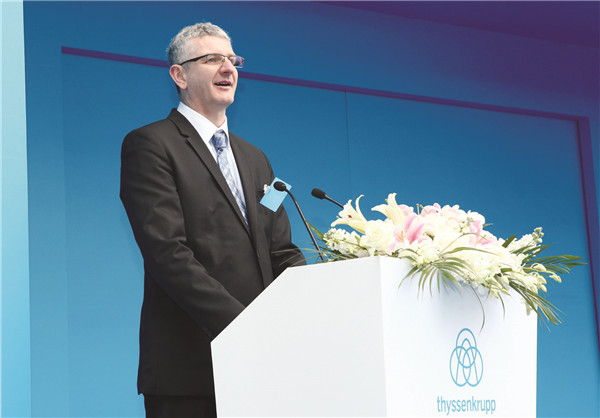 |
|
CEO of Thyssenkrupp Elevator China, Jurgen Bohler, is confident that his company will meet the increasing demands of China's urbanization. |
Elevator experts thyssenkrupp Elevator look to capitalize on China's urbanization demands with a keen focus on local needs and tech innovations
Though he may be German, Jurgen Bohler, CEO of thyssenkrupp Elevator China, is able to expertly dish out professional terms in Mandarin when conversing with his Chinese business partners. Besides being fluent in the language, Bohler also loves his Chinese tea.
These traits reflect his belief that localization is the most effective way to build a bond with the Chinese market, and Bohler has taken significant steps to ensure this is the case as he led efforts in creating the Sanfte brand of elevators in 2011 that was targeted specifically at the local market.
"Learning the local culture is also very helpful for bridging the gap between the Western and Chinese cultures, which is essential in managing a multi-national company," said Bohler, who has worked in thyssenkrupp for over two decades.
A subsidiary of German conglomerate thyssenkrupp AG, thyssenkrupp Elevator is an integration of the group's global activities in passenger transportation systems and has customers in 150 countries.
Over the past two decades, thyssenkrupp Elevator has been steadily growing in China by increasing its investments and carrying out several research and development projects. The group has in the last five years invested more than $558 million to grow their various businesses in China, with Bohler saying that the elevator market is key to their development.
In addition, the company has expanded its sales markets to include third and fourth tier cities. It now has almost 10,000 employees working at 68 branches and 132 offices across seven regions in China. thyssenkrupp Elevator will also be introducing new innovations and technologies to China to support urbanization.
"I have witnessed dramatic changes in China in the past 20 years. The strong and rapid urbanization trend has made China the largest new installation market in the world and I believe the momentum will continue," said Bohler, who joined thyssenkrupp Elevator China in 1996.
To keep up with this momentum, thyssenkrupp Elevator started construction of its new 450 million yuan Zhongshan elevator plant and a new test tower in Guangdong province in 2015. Upon completion, the plant will cover an area of nearly 100,000 square meters and include a world-class 248-meter test tower, which will support the development of high-end elevators for the global and local markets.
Earlier in March, the company launched a new 15,000 square meter headquarters in Shanghai's Songjiang district which cost 120 million yuan. The company also will purchase an additional 10,000 square meters of land adjacent to its Songjiang's plant where it will build a new electrical workshop and logistics center as part of efforts to cater to an increasing demand for elevators.
"I am quite confident we will see an increasing demand for elevators in high-rise buildings given the pace of urbanization in China," said Andreas Schierenbeck, chairman of the executive board of thyssenkrupp Elevator AG.
According to statistics from Bosi Data, a market research firm, China will still be the largest elevator market in the world in 2018, with about 1.25 million operational units across the country. The current production and sales volumes of elevators in China accounts for two-thirds of the global amount.
"We've noticed the rapid development of local elevator brands and many of them are running their business very successfully. This motivates us to keep providing products, solutions and service that can best benefit our customers," said Bohler.
Thyssenkrupp Elevator has always been known to stand out from the competition with its innovative technology, and the TWIN elevator is one such example. The system operates two cars independently within the same shaft and can take passengers to two different floors at the same time, thus reducing waiting time.
Other innovations include the MULTI, a rope-less elevator system that is driven by linear motor technology as well as MAX, a game-changing predictive and pre-emptive service solution that utilizes the power of Microsoft Azure Internet of Things technology to dramatically increase current availability levels of existing and new elevators.
Thyssenkrupp Elevator estimates that the technology used in MAX will help to reduce the time clocked by all elevator maintenance in the world (190 million hours) by between 25 and 35 percent.
"The company is making great efforts to create unique and efficient urban mobility solutions to address the demands of China's urban development. We have the innovations to face the upcoming needs of existing and future megacities," said Schierenbeck.
